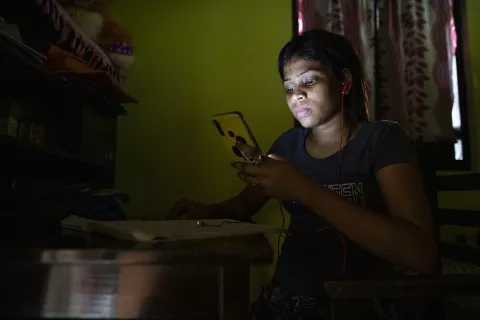Talking about body image, bullying and peer pressure
Support your child's mental health

We all want what's best for our children, but being a parent isn't always easy.
Our mental health is a fundamental part to our overall health and well-being. As a parent, you play a huge role in supporting your child's mental well-being. Nurturing and loving care build a strong foundation, helping your child to develop the social and emotional skills they need to lead a happy, healthy and fulfilled life.
Here are expert tips and resources to help you support your child's and your own mental health. These tips will help you to explain better sensitive issues around body image, peer pressure and bullying.

Dealing with body image issues
Talk about puberty
Explain to your child how the human body functions and that puberty is a natural process that everyone experiences. Their body will go through change too.
Positive motivation
Don’t set an example by pointing out negative physical attributes in others or calling someone derogatory nicknames. Children pick up on this and may do the same or feel uncomfortable with their body. Instead, praise the good qualities you see in your child and others.
Set a good example
How you acknowledge your own body and that of others can get imprinted in the mind of your child. Tell them that the purpose of being active and having a healthy diet is not just to look better, it has so many more benefits.
Limit social media exposure
There is no doubt that children are getting influenced by what they view on social media. In the midst of trying to be trendy, children are exposed and vulnerable, and can experience body shaming.
Set rules for your child and how they use social media and discuss about the type of content they post.

Dealing with peer pressure
Know who your child is spending time with
As a parent, it’s good to know who your child is friends with. Encourage your child to bring their friends over to spend some time at home. That way, you know if they are a good or bad influence on your child.
Teach them that it’s fine to say no
Your child needs to know that it is perfectly fine to say no in certain situations. And you can set an example for them by being clear and firm in decisions. It allows them to use the same language with their peers if they are uncomfortable or unsure about something.
Give them time to talk about their issues
Stay calm and listen to what they have to say. Make them feel comfortable in talking about these issues. Understand it from their perspective and don’t blame them for what is happening.
Every child deserves their bit of freedom
Children want to be free and independent to explore the world around them. As parents, you can define how much is acceptable. Talk to them about friends who are influencing their decisions and if it’s worth it all?
Is a friend truly a friend?
Help your child understand what a true friend is. If this friend is forcing your child to do something regretful or be someone they are not, is that person really worth being friends with?
Understand issues from your child's perspective and don’t blame your children for for what is happening.

Dealing with bullying
Listen to what they have to say
You need to listen to what your child has to say about bullying. Take him seriously and empathize calmly. Support your child by assuring them that what’s happening is wrong; you will get them some help with the problem.
Have a frank and open discussion with them
Talk with your child about your own experiences. Encourage them to talk to other adults in their lives with who they might be close. Do your best to have the kind of relationship where you keep the lines of communication open.
Problem solve together
You can help your child by having problem-solving conversations about bullying and coming up with strategies to overcome it together. Having a proactive conversation and discussing tactics regularly is much better than reacting out of fear or in anger.
Teach them how to deal with bullies
Walking away and not engaging with a bully is one of the best ways to defuse such situations. You can practice role-playing to not show anger or fear.
Know how to stand up against bullying
One simple phrase like “Cut it out” or “Stop it” or “That’s not funny” can be very effective when your child is being bullied. Encourage them to find a way to say something that feels right to them. They don’t need to insult the other person but speaking up is powerful.
Walking away and not engaging with a bully is one of the best ways to defuse such situations. You can practice role-playing to not show anger or fear.




